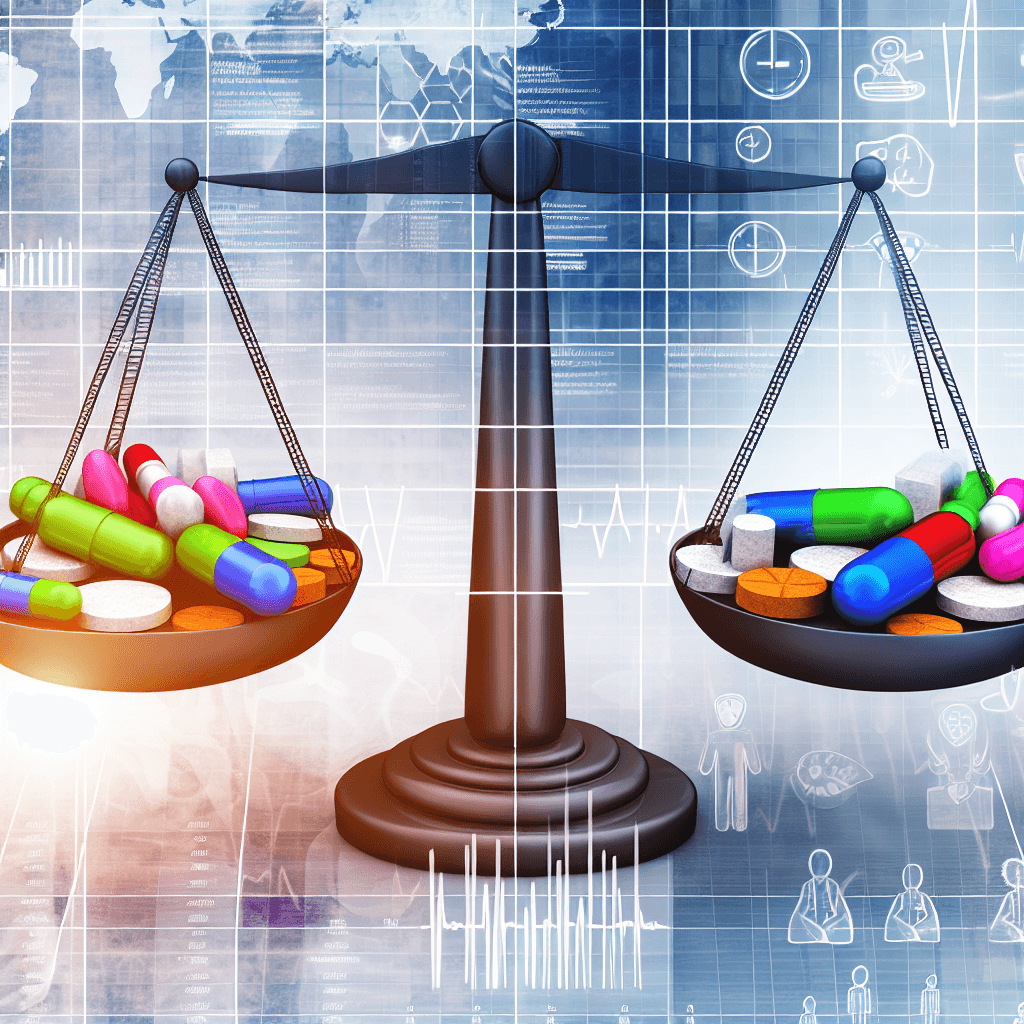Discover the powerful impact of nutraceuticals in preventive healthcare. Learn how these natural supplements can improve your overall well-being.
The Role of Nutraceuticals in Preventive Healthcare

Table of Contents
- Introduction
- Benefits of Incorporating Nutraceuticals in Your Daily Diet for Preventive Healthcare
- Exploring the Science Behind Nutraceuticals and Their Impact on Preventive Healthcare
- The Role of Nutraceuticals in Managing Chronic Diseases and Promoting Preventive Healthcare
- Understanding the Importance of Quality and Safety in Nutraceuticals for Preventive Healthcare
- Q&A
- Conclusion
“Empowering your health with the power of nature – Nutraceuticals for a healthier tomorrow.”
Introduction
Nutraceuticals, also known as functional foods or dietary supplements, have gained significant attention in recent years for their potential role in preventive healthcare. These products are derived from natural sources and are believed to provide health benefits beyond basic nutrition. With the rise in chronic diseases and the increasing interest in holistic approaches to health, the use of nutraceuticals has become a popular topic in the field of preventive healthcare. In this essay, we will explore the role of nutraceuticals in preventive healthcare and their potential benefits for overall health and well-being.
Benefits of Incorporating Nutraceuticals in Your Daily Diet for Preventive Healthcare
Nutraceuticals, a term derived from the words “nutrition” and “pharmaceuticals,” refer to food or food products that provide health benefits beyond basic nutrition. These products have gained popularity in recent years as people become more conscious of their health and seek preventive measures to maintain it. With the rise of chronic diseases and lifestyle-related illnesses, the role of nutraceuticals in preventive healthcare has become increasingly important.
Incorporating nutraceuticals into your daily diet can have numerous benefits for your overall health and well-being. These products are rich in essential vitamins, minerals, and other nutrients that are vital for maintaining a healthy body. They also contain bioactive compounds that have been scientifically proven to have health-promoting properties.
One of the main benefits of incorporating nutraceuticals into your daily diet is their ability to boost the immune system. The immune system is responsible for protecting the body against diseases and infections. Nutraceuticals such as probiotics, prebiotics, and antioxidants have been shown to enhance the immune system’s function, making it more effective in fighting off illnesses. This is especially important in today’s world, where the threat of infectious diseases is ever-present.
Moreover, nutraceuticals can also help in preventing chronic diseases. Chronic diseases, such as heart disease, diabetes, and cancer, are the leading causes of death worldwide. These diseases are often linked to poor dietary habits and lifestyle choices. Nutraceuticals, on the other hand, provide the body with essential nutrients and bioactive compounds that can help prevent the development of these diseases. For example, omega-3 fatty acids found in fish oil have been shown to reduce the risk of heart disease, while polyphenols in green tea have been linked to a lower risk of cancer.
In addition to preventing diseases, nutraceuticals can also help in managing existing health conditions. For instance, people with high cholesterol levels can benefit from incorporating plant sterols and stanols into their diet. These compounds have been shown to lower cholesterol levels and reduce the risk of heart disease. Similarly, individuals with joint pain and inflammation can benefit from consuming turmeric, a spice with anti-inflammatory properties.
Another benefit of nutraceuticals is their role in promoting mental health. The brain requires a constant supply of nutrients to function properly, and deficiencies in certain nutrients have been linked to mental health disorders such as depression and anxiety. Nutraceuticals such as omega-3 fatty acids, B vitamins, and magnesium have been shown to have a positive impact on mental health by improving mood and reducing symptoms of depression and anxiety.
Moreover, incorporating nutraceuticals into your daily diet can also improve your overall quality of life. These products can provide a natural energy boost, improve digestion, and promote healthy skin, hair, and nails. They can also help in weight management by providing essential nutrients while keeping calorie intake in check.
It is important to note that nutraceuticals are not a replacement for a healthy diet and lifestyle. They should be used as a supplement to a well-balanced diet and regular exercise. However, incorporating them into your daily routine can provide additional health benefits and help prevent the development of diseases.
In conclusion, the role of nutraceuticals in preventive healthcare cannot be overstated. These products offer a natural and effective way to boost the immune system, prevent chronic diseases, manage existing health conditions, and promote mental health. By incorporating them into your daily diet, you can reap the numerous benefits they offer and improve your overall health and well-being. So, make sure to include nutraceuticals in your daily routine and take a step towards a healthier and happier life.
Exploring the Science Behind Nutraceuticals and Their Impact on Preventive Healthcare

Nutraceuticals, a term coined from the words “nutrition” and “pharmaceuticals”, refer to food or food products that provide health benefits beyond basic nutrition. These products have gained popularity in recent years as people become more conscious of their health and seek preventive measures to avoid diseases. The use of nutraceuticals in preventive healthcare has been a topic of interest for researchers and healthcare professionals, as they explore the science behind these products and their potential impact on overall health.
The concept of using food as medicine is not new. In fact, ancient civilizations have long recognized the healing properties of certain foods and herbs. However, it was not until the 1980s that the term “nutraceuticals” was first used by Dr. Stephen DeFelice, founder and chairman of the Foundation for Innovation in Medicine. Since then, the market for nutraceuticals has grown exponentially, with a wide range of products available, including dietary supplements, functional foods, and beverages.
One of the key reasons for the popularity of nutraceuticals is their potential role in preventive healthcare. With the rise of chronic diseases such as diabetes, heart disease, and cancer, there is a growing need for effective preventive measures. Nutraceuticals, with their natural and holistic approach, have been touted as a potential solution to this problem. But what exactly is the science behind these products and how do they impact preventive healthcare?
Firstly, nutraceuticals are believed to work by providing essential nutrients and bioactive compounds that support the body’s natural defense mechanisms. For example, antioxidants found in fruits and vegetables can help neutralize free radicals, which are known to cause cellular damage and contribute to the development of chronic diseases. Similarly, omega-3 fatty acids found in fish oil have been shown to have anti-inflammatory properties, which can help reduce the risk of heart disease and other inflammatory conditions.
Moreover, nutraceuticals can also influence gene expression and cellular signaling pathways, which play a crucial role in disease prevention. For instance, curcumin, a compound found in turmeric, has been shown to modulate gene expression and inhibit the growth of cancer cells. Similarly, resveratrol, a compound found in red grapes, has been found to activate genes that promote longevity and protect against age-related diseases.
In addition to their direct impact on the body, nutraceuticals can also play a role in preventive healthcare by promoting healthy lifestyle habits. Many nutraceutical products are marketed as part of a healthy diet and exercise regimen, encouraging individuals to make positive changes in their daily routines. This can have a significant impact on overall health, as a healthy lifestyle is known to be one of the most effective ways to prevent chronic diseases.
However, it is important to note that the use of nutraceuticals in preventive healthcare is not without controversy. Some critics argue that the evidence supporting the health benefits of these products is limited and that they are often marketed with exaggerated claims. Furthermore, the lack of regulation in the nutraceutical industry has raised concerns about the safety and efficacy of these products.
To address these concerns, researchers continue to conduct studies to better understand the science behind nutraceuticals and their potential impact on preventive healthcare. The results of these studies can help healthcare professionals make informed recommendations to their patients and guide individuals in making informed decisions about their health.
In conclusion, the use of nutraceuticals in preventive healthcare is a growing trend that has captured the interest of researchers and healthcare professionals. The science behind these products suggests that they can provide essential nutrients and bioactive compounds that support the body’s natural defense mechanisms and influence gene expression and cellular signaling pathways. However, more research is needed to fully understand the potential benefits and risks of nutraceuticals in preventive healthcare. As with any health-related decision, it is important to consult with a healthcare professional before incorporating nutraceuticals into one’s diet.
The Role of Nutraceuticals in Managing Chronic Diseases and Promoting Preventive Healthcare
Nutraceuticals, also known as functional foods or dietary supplements, have gained popularity in recent years as a means of promoting preventive healthcare. These products are derived from natural sources and are believed to have medicinal or health-promoting properties. While they are not intended to cure diseases, they are often used as a complementary approach to traditional medicine in managing chronic diseases and promoting overall health and wellness.
One of the key roles of nutraceuticals in preventive healthcare is their ability to manage chronic diseases. Chronic diseases, such as diabetes, heart disease, and cancer, are the leading causes of death worldwide. These diseases are often caused by lifestyle factors such as poor diet, lack of physical activity, and smoking. Nutraceuticals, with their potential to improve overall health and prevent the onset of chronic diseases, have become an important aspect of preventive healthcare.
One of the most well-known nutraceuticals is omega-3 fatty acids, commonly found in fish oil supplements. These fatty acids have been shown to have numerous health benefits, including reducing the risk of heart disease. Studies have also shown that omega-3 fatty acids can help lower blood pressure and improve cholesterol levels, both of which are risk factors for heart disease. As heart disease is a major cause of death globally, the use of omega-3 fatty acids as a preventive measure is highly recommended.
Another nutraceutical that has gained attention for its potential in managing chronic diseases is curcumin, the active ingredient in turmeric. Curcumin has anti-inflammatory and antioxidant properties, making it a promising supplement for conditions such as arthritis and inflammatory bowel disease. It has also been studied for its potential in preventing and treating cancer. While more research is needed, the use of curcumin as a preventive measure for chronic diseases shows promise.
In addition to managing chronic diseases, nutraceuticals also play a role in promoting overall health and wellness. Many of these products contain vitamins, minerals, and other nutrients that are essential for maintaining good health. For example, vitamin D, commonly found in nutraceuticals, is crucial for bone health and has also been linked to a reduced risk of certain cancers. Similarly, probiotics, which are beneficial bacteria found in some nutraceuticals, have been shown to improve gut health and boost the immune system.
Moreover, nutraceuticals can also help fill nutritional gaps in the diet. In today’s fast-paced world, it can be challenging to maintain a balanced and nutritious diet. Nutraceuticals can provide a convenient and effective way to supplement the diet with essential nutrients. For example, multivitamin supplements can help ensure that individuals are meeting their daily recommended intake of vitamins and minerals.
It is important to note that while nutraceuticals can play a significant role in preventive healthcare, they should not be seen as a replacement for a healthy lifestyle. A balanced diet, regular exercise, and avoiding harmful habits such as smoking are still crucial for maintaining good health. Nutraceuticals should be used as a complementary approach to traditional medicine and a means of promoting overall wellness.
In conclusion, nutraceuticals have a vital role to play in managing chronic diseases and promoting preventive healthcare. With their potential to improve overall health and fill nutritional gaps in the diet, these products have become an important aspect of modern healthcare. However, it is essential to consult with a healthcare professional before incorporating nutraceuticals into one’s routine, as they may interact with certain medications or have adverse effects in some individuals. With proper guidance and use, nutraceuticals can be a valuable tool in promoting preventive healthcare and improving overall well-being.
Understanding the Importance of Quality and Safety in Nutraceuticals for Preventive Healthcare
Nutraceuticals, also known as functional foods or dietary supplements, have gained popularity in recent years as a means of promoting preventive healthcare. These products are derived from natural sources and are believed to have health benefits beyond basic nutrition. With the rise in chronic diseases and the increasing focus on preventive healthcare, the demand for nutraceuticals has also increased. However, with this surge in demand, it is crucial to understand the importance of quality and safety in nutraceuticals for preventive healthcare.
Quality and safety are two essential factors that must be considered when it comes to nutraceuticals. These products are not regulated in the same way as pharmaceutical drugs, which means that there is a higher risk of contamination and mislabeling. Therefore, it is crucial to ensure that the nutraceuticals we consume are of high quality and safe for consumption.
One of the key aspects of quality in nutraceuticals is the sourcing of ingredients. The source of the ingredients used in nutraceuticals plays a significant role in determining the quality and safety of the product. It is essential to ensure that the ingredients are sourced from reputable suppliers and are of high quality. This includes factors such as the use of organic ingredients, non-GMO sources, and sustainable farming practices.
In addition to sourcing, the manufacturing process also plays a crucial role in ensuring the quality and safety of nutraceuticals. The manufacturing process must adhere to strict guidelines and regulations to ensure that the final product is safe for consumption. This includes proper handling and storage of ingredients, as well as following Good Manufacturing Practices (GMP) to prevent contamination.
Another important aspect of quality and safety in nutraceuticals is the testing and certification of the final product. Third-party testing and certification provide assurance that the product meets the required standards and is safe for consumption. This includes testing for potency, purity, and the absence of harmful contaminants. Look for products that have been certified by reputable organizations such as the United States Pharmacopeia (USP) or NSF International.
Apart from quality, safety is also a crucial factor to consider when it comes to nutraceuticals. As these products are not regulated in the same way as pharmaceutical drugs, there is a higher risk of contamination and adverse effects. Therefore, it is essential to be aware of potential side effects and interactions with other medications. It is always recommended to consult with a healthcare professional before starting any new nutraceutical regimen.
Furthermore, it is crucial to be cautious of false claims and misleading information when it comes to nutraceuticals. Many products may make bold claims about their health benefits without any scientific evidence to back them up. It is essential to do thorough research and look for products that have been clinically tested and proven to be effective.
In conclusion, the role of nutraceuticals in preventive healthcare cannot be ignored. These products have the potential to improve overall health and prevent chronic diseases. However, it is crucial to understand the importance of quality and safety in nutraceuticals. Sourcing, manufacturing, testing, and certification are all crucial factors that must be considered to ensure that the products we consume are of high quality and safe for consumption. By being aware of these factors and making informed choices, we can reap the benefits of nutraceuticals in promoting preventive healthcare.
Q&A
1. What are nutraceuticals?
Nutraceuticals are food or food products that provide health benefits beyond basic nutrition. They are often derived from natural sources and contain bioactive compounds that have potential therapeutic effects on the body.
2. How do nutraceuticals contribute to preventive healthcare?
Nutraceuticals can help prevent chronic diseases and promote overall health by providing essential nutrients and bioactive compounds that support various bodily functions. They can also help reduce the risk of developing certain health conditions, such as heart disease, diabetes, and cancer.
3. What are some common examples of nutraceuticals?
Some common examples of nutraceuticals include vitamins, minerals, herbal supplements, probiotics, and omega-3 fatty acids. Functional foods, such as fortified cereals and beverages, can also be considered nutraceuticals.
4. Are nutraceuticals a substitute for medication?
No, nutraceuticals should not be used as a substitute for medication prescribed by a healthcare professional. They can be used as a complementary approach to support overall health and prevent disease, but they should not replace necessary medical treatment. It is important to consult with a healthcare provider before incorporating nutraceuticals into your healthcare routine.
Conclusion
In conclusion, nutraceuticals play a significant role in preventive healthcare by providing essential nutrients and promoting overall health and wellness. They have been shown to have various health benefits, such as reducing the risk of chronic diseases and improving immune function. Incorporating nutraceuticals into a healthy lifestyle can help individuals maintain optimal health and prevent the onset of illnesses. However, it is important to consult with a healthcare professional before adding any nutraceuticals to one’s diet to ensure safety and effectiveness. With the growing interest in preventive healthcare, the use of nutraceuticals is likely to continue to increase in the future.








